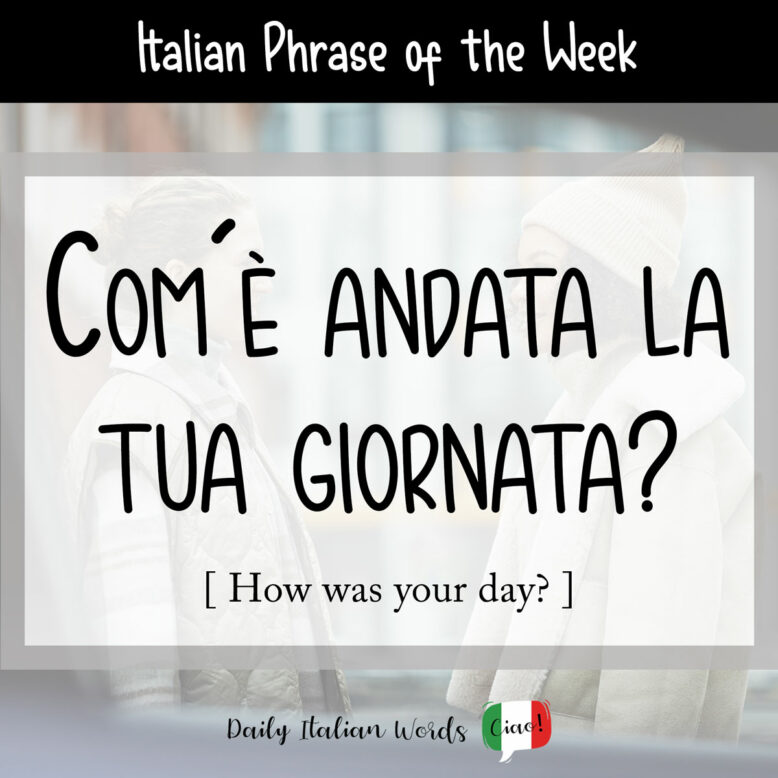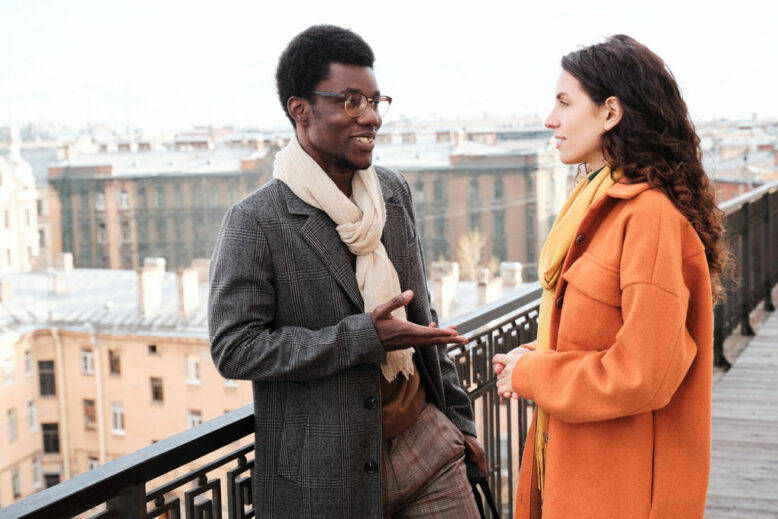When you come home from school or work, what is the first question your family asks you? I would be willing to wager that they usually greet your arrival with something along the lines of “How was your day?” or “How did your day go?“! There are various phrases you can use to ask this question in Italian, as we’re about to see.
One of the closest translations is:
Com’è andata la tua giornata?
How was your day?
(lit. How did your day go?)

Let’s take a look at how to form this question in Italian:
Come
is a question word in Italian that can translate as how or what depending on the context. It can be shortened to com’ when followed by a verb beginning with a vowel like è (is) or era (was).
è andata*
is the passato prossimo of andare (to go), so it can translate as has gone / went / did go in English depending on the context.
Andare always takes the auxiliary essere (to be) rather than avere (to have), which is why Italians say è andata (literally “is gone”) and not ha andato.
The past participle is the feminine andata, not the masculine andato, because we’re talking about la giornata (the day, as in from morning to evening), which is a feminine noun.
la
is the feminine definite article. It is the equivalent of the in English.
tua**
is the equivalent of your in English. It’s in its feminine form because giornata is a feminine noun.
giornata
is one possible translation for the word day in Italian. We invite you to check out the various differences between giorno and giornata in our dedicated article!
*Note that it is also possible to use the verb essere (Com’è stata la tua giornata?) in the place of andare. This would be the most literal translation of the English phrase How was your day? However, my husband, who grew up in Torino, told me that instinctively, he would be inclined to use andare.
**Note about the use of ‘tua’
The Italian language does not necessitate the use of possessive pronouns as much as English, so tua is not always mandatory. It is sufficient to say (literally) How was the day? or How did the day go? because the listener can infer from the context that the speaker is asking about their day, and not someone else’s. Therefore, Com’è andata la giornata? also works.

Another way to ask this question is to use the word oggi instead of giornata, with oggi meaning today. It is one of the simplest, and one of the most common ways to ask this question.
Com’è andata oggi?
How did it go today?
These question phrases can either refer to the person’s day in general, or to a specific event that both parties know about, and therefore is implied in the conversation.
Of course, if you wish, you can pose a more precise question. For example:
Com’è andata la (tua) giornata a scuola?
How was your day at school?
Com’è andata oggi a scuola?
How did it go today at school?
Some possible answers to these questions include:
- Bene, grazie! = Fine, thanks!
- (È andata) alla grande! = (It went) really well!
- Meglio di così non poteva andare. = It couldn’t have gone better.
- Non male! = Not bad!
- Bene, tutto sommato. = Well, all things considered.
Note that if the question is asked with the verb essere instead of andare (Com’è stata la tua giornata instead of Com’è andata la tua giornata), most of the answers above will sound strange because they are built upon the use of andare as an expression. The answers below are more appropriate in response to the essere version:
- (È stata) soddisfacente. = (It was) satisfying.
- (È stata) molto produttiva! = (It was) very productive!
- È stata una giornata perfetta! = It was a perfect day!
- (È stata) abbastanza interessante! = (It was) interesting enough!
- Tutto sommato, è stata una buona giornata. = All things considered, it was a good day.

Heather Broster is a graduate with honours in linguistics from the University of Western Ontario. She is an aspiring polyglot, proficient in English and Italian, as well as Japanese, Welsh, and French to varying degrees of fluency. Originally from Toronto, Heather has resided in various countries, notably Italy for a period of six years. Her primary focus lies in the fields of language acquisition, education, and bilingual instruction.


